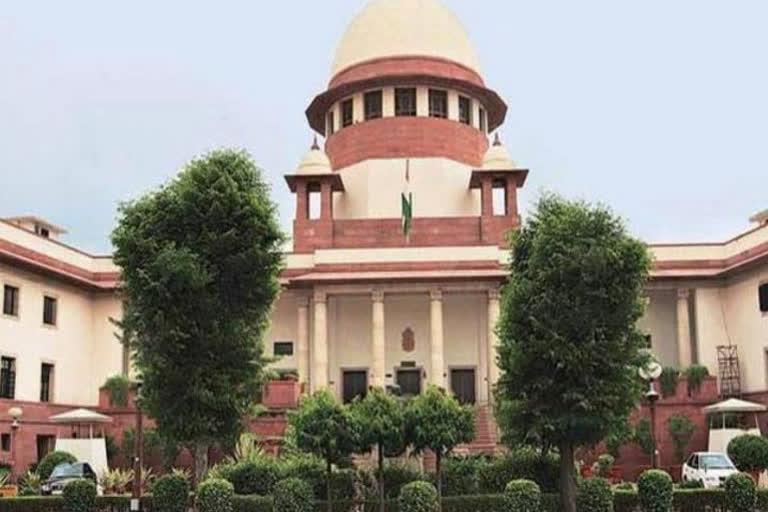New Delhi: The Supreme Court on Tuesday asked Tamil Nadu government to request the state governor to apprise it of his decision on the mercy plea of a convict in the Rajiv Gandhi assassination case.
A bench of justices L Nageswara Rao and Deepak Gupta gave this direction to the state government after it submitted to the bench that the state Cabinet has already passed a resolution and recommended to the governor to order the premature release of all seven convicts in the case.
The Tamil Nadu government submitted to bench that it, however, does not have any information about the governor's decision on the mercy petitions filed by the convicts under Article 161 of the Constitution.
At this, the apex court bench asked the state government to itself ask the governor about his decision on mercy pleas of the convicts, observing that it cannot issue any direction to the governor.
The bench, however, observed that the governor "cannot sit indefinitely on a file".
The Article 161 empowers the governor to pardon a convict in any criminal case.
The bench was hearing a plea of 46-year-old A G Perarivalan who has sought suspension of his life sentence in the case till the CBI-led Multi-Disciplinary Monitoring Agency (MDMA) probe is completed.
Appearing for Tamil Nadu government, advocate Balaji Srinivasan at the outset submitted to the bench that they have no information as to what decision the governor has taken on the mercy petitions of the convicts.
"The Cabinet had passed a resolution on September 9, 2018, for the premature release of the Rajiv Gandhi assassination case convicts and recommended it to the governor. We have no information as to what decision the governor has taken on the mercy petitions filed by the convicts under Article 161. We cannot control the decision of the governor as he is a superior authority," he said.
To this, the bench said, "You (state) can ask him as the courts cannot direct the governor. He cannot sit indefinitely on the file. As governor is the representative of the state government, you can request him to know about his decision".
Senior advocate Gopal Sankaranarayanan, appearing for Perarivalan said that a direction in this regard may help the state government in knowing the governor's decision.
Read: CBI awaiting responses of three countries in Rajiv Gandhi assassination case: SC told
The bench said it is not passing any order and deferred the matter for hearing after two weeks.
On January 21, the apex court had asked the state government to inform whether a decision has been taken by it on a mercy petition of a convict in the case.
Perarivalan through his counsel had contended that though the state has taken a decision on his mercy petition but his application is pending with the governor.
The MDMA was set up in 1998 on the recommendations of the Justice M C Jain Commission of Inquiry which had probed the conspiracy aspect of Gandhi's assassination.
It is headed by a CBI official and comprises officers from the Intelligence Bureau, the Research and Analysis Wing and the Revenue Intelligence, among other agencies.
The top court had on January 14, expressed its displeasure over the latest status report filed by the MDMA on its probe and said it wanted to know about the progress made in the ongoing investigation in the past two years.
Perarivalan's counsel had earlier said his role was only limited to procuring nine-volt batteries, which were allegedly used in the improvised explosive device (IED) that had killed Gandhi.
On March 14 last year, the apex court had asked the MDMA to file a status report with regard to a Letter Rogatory (LR) sent to Sri Lanka for examining one of the accused, Nixon alias Suren, who is lodged in a Colombo jail.
The top court had earlier dismissed a plea of Perarivalan seeking recall of the May 11, 1999, verdict upholding his conviction.
It had said the material brought on record before it does not inspire confidence to interfere with the verdict in which Perarivalan and three others were initially awarded death sentence, which was later commuted to life term.
The CBI had earlier submitted that Perarivalan had even visited Jaffna in Sri Lanka in the first week of June 1990, besides attending a public meeting along with other conspirators which were addressed by former Prime Minister V P Singh on May 7, 1991, in Tamil Nadu.
Perarivalan's counsel had submitted that he was just a 19-year-old when the incident took place and had no knowledge of what he was doing and for what purpose the batteries were purchased.
Gandhi was assassinated on the night of May 21, 1991, at Sriperumbudur in Tamil Nadu by a woman suicide bomber, identified as Dhanu, at a poll rally.
Fourteen others, including Dhanu herself, were also killed. Gandhi's assassination was perhaps the first case of suicide bombing which had claimed the life of a high-profile leader.
In its May 1999 order, the top court had upheld the death sentence of four convicts -- Perarivalan, Murugan, Santham and Nalini -- in the assassination case.
In April 2000, the Tamil Nadu governor had commuted the death sentence of Nalini on the basis of the state government's recommendation and an appeal by former Congress president and Rajiv Gandhi's widow Sonia Gandhi.
On February 18, 2014, the top court had commuted the death sentence of Perarivalan to life imprisonment, along with that of two other prisoners - Santhan and Murugan - on grounds of a delay of 11 years in deciding their mercy pleas by the Centre.



